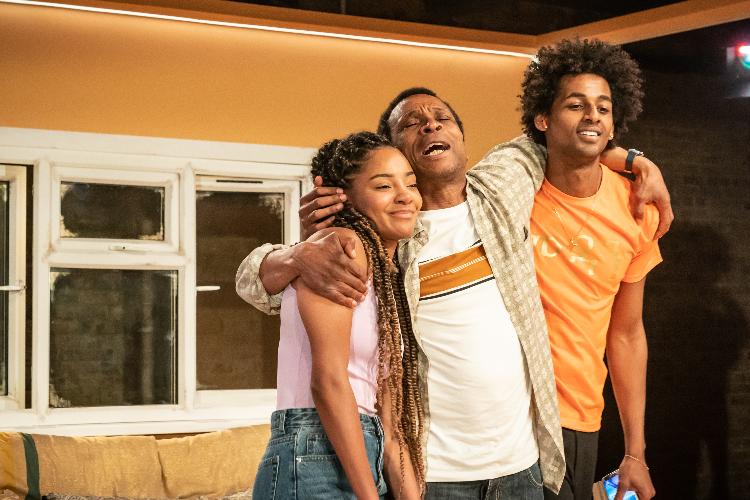Have you ever wondered how other families fight through a crisis? Or what does grief look like in the eyes of deeply religious culture? House Of Ife is a bubbling, tender story that gives us that experience with themes of grief, family love, cultural clashes and Ethiopian joy.
I enter and the traverse set by Frankie Bradshaw sits between the two halves of the audience. It’s simple but effective and clever. We are sitting in someone’s home waiting for them to come into the living room.
Lynette Linton’s production opens and buzzes in the London household of a mother and her three children following the loss of their brother Ife. The siblings are setting up the post-burial wake. The scramble and chaos of the scene work feel authentic. The bounce of the siblings raving to Lethal Bizzle somehow feels welcome at a time of great sadness. Mother Meron enters, she is stern and strict on mourning the traditional religious way - her children don’t seem to connect with the culture. Under their mother's watch, the siblings argue, they laugh, they tease and hold each other. The family dynamic that writer Beru Tessema brings to this piece is very real and the audience feel like a (at times awkward) fly on the wall.
Ife has passed and the family are reeling, particularly his twin sister Aida. His funeral is over and we see his mother (Sarah Priddy) and father/ex-husband (Jude Akuwudike) come face to face. The two play opposite each other with fierce tension. They do a brilliant job of portraying the painful lifelong connection that parenthood can be when a family is no longer under the safe roof. Father Soloman has travelled over from Addis, Ethiopia. He is undoubtedly a traditional man. Though flawed, Soloman is charismatic - It has been years since I’ve heard “this is the day” and it puts a wide smile on my face. We hear brief mentions of the war ‘back home’ but the piece is very much centred in this London household of a migrant family who is at arms themselves.
It’s painful to watch at times but for all the best reasons. We see the fragility of every relationship within the household following their loss but we also see beautiful moments of strength and sentiment. Twin Aida is deeply haunted by the connection to her brother and her guilt in his passing. Middle sister Tsion is sensible and keeps the peace but feels neglected amongst the chaos. (Karla-Simone Spence & Yohanna Ephrem) are commanding. We feel the warmth of sisterhood throughout.
Little brother Yosi is a relatable character who is much more interested in writing bars than talking about feelings. Michael Workeye is simply outstanding in his role and provides all the comic relief the audience needs. He manages to pace almost every scene along whilst also showing us subtle moments of grief and the anguish he has towards his father. I really laughed with him. Definitely an actor to watch.
The play unfolds with great pace for a two-hour show so we don't miss the interval. The end scenes are jaw clenchingly tense. A breakfast scene is the last time we see all five characters together and it had me on the edge of my seat. This play is a victory and it feels like it as the lights flash out.
The sound design by Duramaney Kamara is a reoccurring smooth nod to Ethiopian and western heritage running alongside each other. The transitions take us through time in a slick fashion. Kane Husband's movement direction is a highlight and gives the characters extra language for the audience to interpret.
I’m so thrilled that Lynette Linton and The Bush team have commissioned this work by Beru Tessema. To see an Ethiopian family story on a main stage feels like a triumph in itself especially when the writing is so brilliant. The intricacy of Lynette’s direction and attention to detail is beautiful to watch. I left my seat with reflections of my own, feeling aware of myself as a migrant in this country. The play felt like an education on a culture we don’t get to see and we really need it.
House Of Ife runs at The Bush Theatre until 11th June.
Review: Nicole Botha Photo: Marc Brenner

